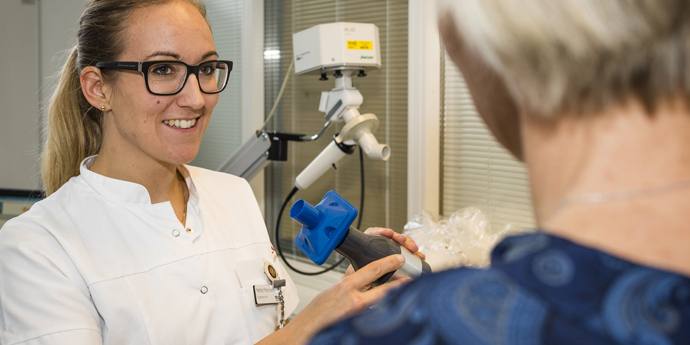
Annual Research Report 2021
Interstitial Lung Diseases
Diagnosis and treatment of interstitial lung diseases (ILD) are the main focus at the Danish Center for Interstitial Lung Diseases, at the Department of Respiratory Diseases and Allergy. The Department receives approximately 500 new referrals each year. The department performs pulmonary function tests, high resolution computed tomographies (HRCT), 6 minute walk tests, rheumatologic and occupational evaluation, and when needed, bronchoscopy with bronchoalveolar lavage and cryobiopsies, and surgical lung biopsies. These results and the following multidisciplinary team discussions form a valuable base for decisions on treatment and follow-up strategy. Patients with idiopathic pulmonary fibrosis (IPF) are, based on an individual evaluation, offered antifibrotic treatment, genetic and lung transplant evaluation. Patients with inflammatory ILDs are offered anti-inflammatory treatment. On-going research in ILD allow for the best possible treatment.
Sarcoidosis
Diagnosis and treatment of sarcoidosis has high priority at the Danish Center for Sarcoidosis, a multidisciplinary center with participation of all specialities involved in the diagnosis and treatment of sarcoid patients. The center is based at the Department of Respiratory Diseases and Allergy.
Lung Cancer
The Clinic for Lung Cancer Investigations in the Department of Respiratory Diseases and Allergy is an out patient clinic handling fast track diagnostics for patients suspected of lung cancer or other malignancies in the thorax.
The fast track diagnostics include some or all of the following investigations: CT, PET-CT, lung function tests, transthoracic lung biopsy (guided by CT, ultrasound and flouroscopy), other transcutaneous biopsies and endoscopy with EBUS or EUS, and should be terminated within four weeks from referral.
The clinic has a close collaboration at multidisciplinary team conferences twice weekly with interventional radiologists, thoracic surgeons, thoracic oncologists as well as specialists in nuclear medicine and thoracic pathology for evaluation of test results and treatment decisions. Collegues from regional hospitals participate over video.
The clinic recieves patients from the city of Aarhus and surrounding suburbs and performs specialist interventional procedures in patients from the whole region (one million citizens).
Basic diagnostic and therapeutic interventional procedures are: thoracocentesis, drainage of pneumothorax after transthoracici needle aspiration, bronchoscopy and specialist interventional procedures are: ultrasound endoscopies (1000/year EBUS and EUS), transbronchial cryobiopsies (100/year) and navigational bronchoscopy.
The permanent staff in the clinic are three senior consultants, at number of junior doctors and trainees, five nurses and administrative staff.
COPD
Diagnosis, treatment and preventive measures of Chronic Obstructive Lung Disease (COPD) are the main focus at the COPD Clinic.
The outpatient clinic performs lung functions, instructions in inhaled medicine, and talking with the patients about coping with COPD in daily life. Based on an individual evaluation, valve therapy is offered to patients with emphysematous type of COPD. Furthermore, patients with Alpha-1 antitrypsin deficiency (A1AD) are treated with intravenous infusions.
Affiliation with an outgoing and cross-sectorial lung team, consisting of nurses from the department and the municipality, is offered to patients with severe and very severe COPD. The patients are able to contact the lung team day and night in case of an acute exacerbation of COPD. The lung team provide acute home visit where treatment can be initiated and the patients are monitored by the lung team. The lung team also provide telemedicine and patient education at the patients' home.
Treatment in COPD and coping with the disease in daily life are on-going research areas in the department.